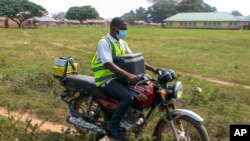Nigerian health officials say some one million doses of COVID-19 vaccines that expired before they could be used will be destroyed. Authorities have blamed the waste on donors who supplied doses that had only a brief shelf life. But Nigeria has also struggled to get people inoculated.
The executive director of Nigeria's National Primary Health Care Development Agency, (NPHCDA), Faisal Shuaib, made the announcement at a weekly COVID-19 briefing in Abuja on Monday.
He said about one million expired doses had been withdrawn from the country’s vaccine supply.
Shuaib added that authorities are working with the national drug control agency and the ministry of environment to ensure the vaccines are destroyed according to health, safety and environmental protocols.
"We're working with NAFDAC (National Agency for Food, Drug Administration and Control) to schedule a date for when this destruction will take place," said Shuaib. "There are protocols that NAFDAC and Abuja environmental protection agency will have to go through."
According to reports, the expired doses are donations from Europe, given to Nigeria through the international COVAX vaccine sharing program, and constitute the biggest number of vaccines to expire in any country.
Nigerian authorities last week attributed the expiration to the short shelf lives of the vaccines before they arrived.
Authorities also acknowledged that logistics and bottlenecks involved in clearing the vaccines also led to loss of valuable time.
Experts say the issue exposes a much wider problem facing many African nations trying to manage vaccines with close expiration dates.
Shuaib in Abuja stated that authorities will no longer be accepting such vaccines.
"The presidential steering committee has also stated that Nigeria will no longer accept vaccines with short shelf lives as they not only exert undue pressure on the health system but also on the people," said Shuaib.
Only about 3.6 percent of Nigeria's adult population have been fully vaccinated, avccording to health officials. The figure represents less than one-tenth of the 40 percent mark authorities had aimed for this year.
Nigerian authorities, like many of their African counterparts, have been struggling to get more people inoculated.
Authorities blame slow uptake on a low turnout of eligible citizens for vaccination. They say that is the reason Nigeria is currently recording an increase in cases of the coronavirus.




